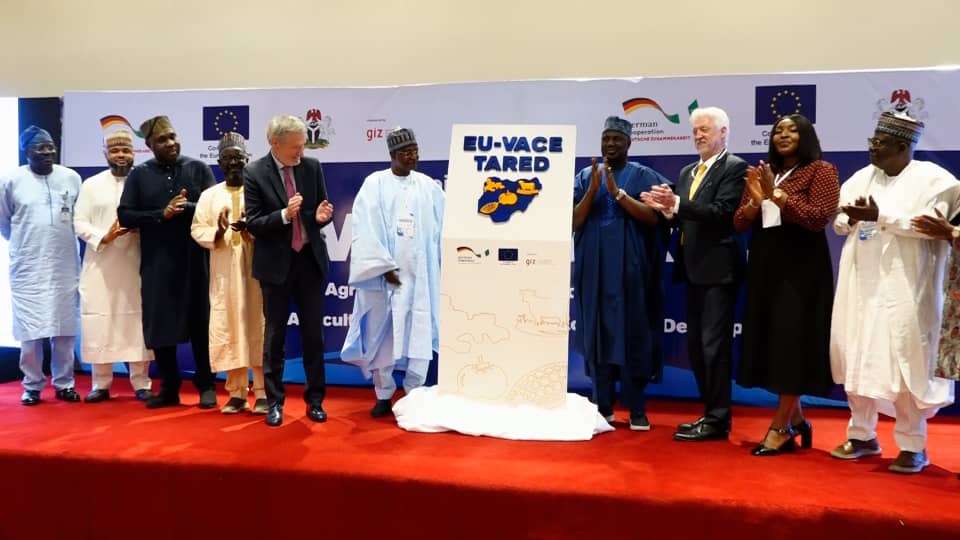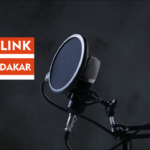The European Union, Germany, and Nigeria have launched a €18.3 million agricultural programme aimed at strengthening key value chains, boosting food security, and reducing the country’s reliance on imports, in what stakeholders described as a historic turning point for Nigeria’s rural economy.
The four-year initiative, known as the EU-VACE TARED Project, will be implemented in seven states and target four major agricultural value chains: dairy, cocoa, tomato, and ginger. It is co-financed by the EU and Germany’s development agency, GIZ, as part of the EU’s Global Gateway Strategy and Team Europe framework.
At Wenesday’s launch in Abuja, EU Ambassador to Nigeria, Gautier Mignot, said agriculture was “a strong pillar for unlocking Nigeria’s economy and welfare” but one held back by infrastructure gaps, limited processing and storage, weak financing, and climate pressures. “Perhaps the most urgent challenge is generational—how can we make agriculture attractive, viable and promising for young Nigerians?” he asked.
Mignot said the EU had committed more than €87 million to climate-smart agriculture in Nigeria, alongside a pipeline of green economy projects worth nearly €1.5 billion. The EU-VACE TARED programme, he added, was central to that effort, designed to create jobs, strengthen food systems, and nurture a new generation of agripreneurs.
Johannes Lehne, Deputy Head of Mission at the German Embassy, described the initiative as a strategic investment in Nigeria’s future. “Fifty years ago, Nigeria was self-sufficient in agricultural production, but this was lost for reasons we all know,” he said. By focusing on innovation, entrepreneurship, and reducing post-harvest losses, he argued, Nigerian farmers would not only thrive locally but also compete again in global markets.
For Germany, Lehne noted, the project is as much about stabilising livelihoods as it is about reducing irregular migration. “When young people have the chance to build a prosperous future in their own country, everyone benefits,” he said.
From the Nigerian side, Minister of State for Agriculture and Food Security, Aliyu Sabi Abdullahi, hailed the project as “epoch-making,” aligning with President Bola Tinubu’s vision of a hunger-free society. He stressed that Nigeria currently spends $1.5 billion annually on dairy imports, despite its vast livestock resources. “Together, we can change this narrative,” he said. “By transforming the dairy sector, we will progressively reduce imports, create local industries, generate employment, and build peace across the land.”
Abdullahi said the project dovetails with the newly launched Nigerian Livestock Growth Acceleration Strategy, which seeks to modernise the sector through productivity gains, local milk production, and integration of smallholders into formal value chains. He added that the inclusion of cocoa, tomato, and ginger would expand employment, rural incomes, and export potential.
Oladoyin Olawaje, representing GIZ and ECOWAS, outlined the project’s four pillars: technical support, policy reform, access to finance, and climate-smart agriculture. She said it would empower smallholder farmers and MSMEs, expand women’s and youth participation, and promote innovations ranging from drip irrigation in tomato production to disease resilience in ginger.
“In cocoa, we will help farmers comply with new EU deforestation regulations while promoting sustainable practices,” she added. “Indeed, the EU-VACE TARED Project has the potential to drive sustainable, positive change and deliver considerable benefits for all stakeholders.”
The programme will be rolled out in Kano, Kaduna, Nasarawa, Kebbi, Plateau, Oyo, Ondo, and Cross River states, with activities ranging from animal health in dairy hubs to market access for ginger farmers.
In his closing remarks, Ambassador Mignot reaffirmed the EU’s long-term commitment: “Together with our member states and financial institutions—what we call Team Europe—we will continue to build a strong partnership with Nigeria.”
Authored by: Usman Umar, Abuja


